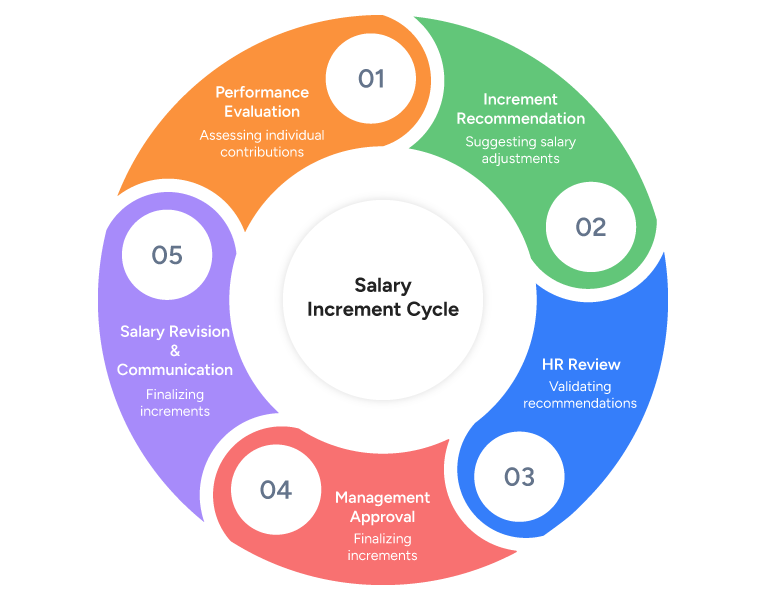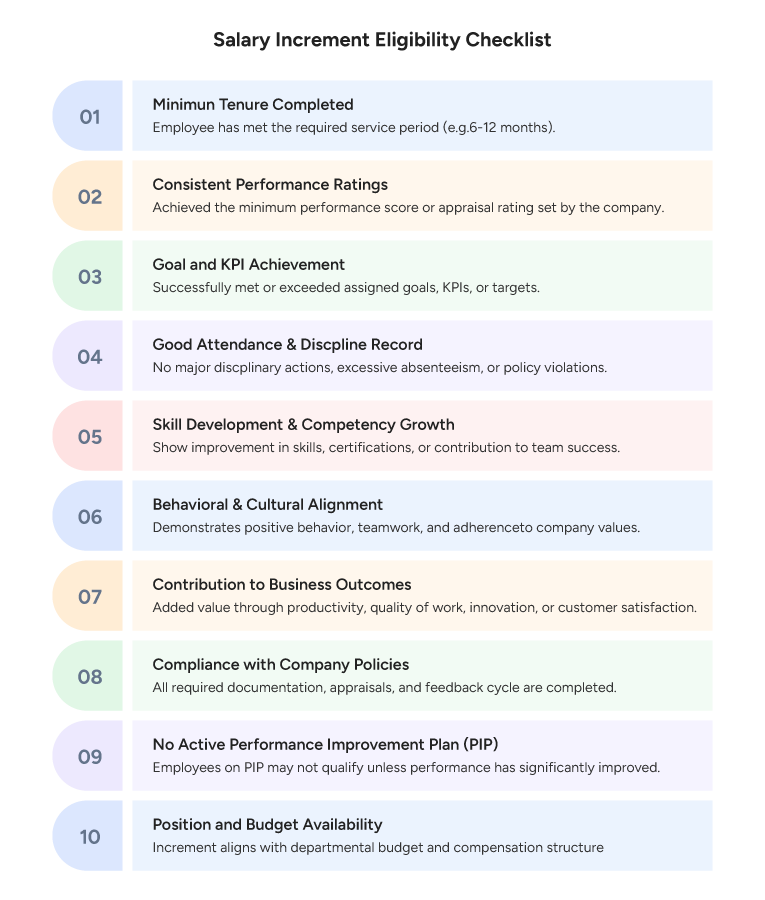Salary Increment in India: Meaning, Types, Calculation & 2026 Hike Trends

Table of Contents
Salary increments are usually determined as a percentage of an employee’s annual salary. Employees view them as a financial and career progression, and in India, it remains a core part of retention strategies.
This guide explains what a salary increment is, why it is essential, and how performance reviews, industry trends, and payroll budgets influence the final amount.
Key Takeaways
- A salary increment for employee groups is planned during scheduled reviews and aligns with internal pay structures, budget, performance, and market standards.
- Different types of increments help organizations reward achievement, career progression, and skill relevance.
- Competitive and well-timed increments support retention, strengthen engagement, and contribute to higher job satisfaction.
- Clear criteria and a structured process help reduce bias and maintain fairness during reviews.
- Linking salary increase to measurable goals strengthens accountability and supports business growth.

What is a Salary Increment?
A salary increment is a pay raise added to an employee’s basic salary as part of a scheduled salary revision. It is usually expressed as a percentage increase decided during the company’s salary review process, often linked to performance results, market benchmarks, and payroll budget approvals.
An increment is applied during the organization’s increment cycle, which may follow quarterly, half-yearly, or annual payroll revision timelines, depending on internal policies and business needs.

Types of Salary Increments
The framework for providing increments varies by an organization’s sector, size, financial position, and workplace culture. Understanding these variations helps employees understand the process and form realistic expectations.
Annual Increment
A routine pay raise is given once a year as part of the organization’s increment cycle and salary review process. It reflects standard growth and may be tied to company policies such as the annual payroll revision.
Performance-Based Increment
A raise given after reviewing an individual’s or a team’s performance. It is usually tied to performance management and may be awarded outside the regular cycle when employees deliver results that exceed expectations.
Promotion-Based Increment
A salary revision is granted when an employee moves into a higher role or assumes additional responsibilities. It is usually part of the organization’s career progression or promotion policy and is typically higher than standard annual increments.
Market Adjustment Increment
A raise is offered to align pay with industry benchmarks during a payroll revision, especially when the market rate changes due to talent shortages or new skill demands.
Retention Increment
A targeted increase is given to retain key employees who hold critical skills or contribute to essential projects. This increment is often decided during leadership or HR discussions on workforce stability.
Inflation/Cost-of-Living Increment
A raise that helps employees maintain their purchasing power as prices rise. Many companies add this component during the annual salary review process to stay competitive.

How to Calculate Salary Increment?
Here is how you can determine the calculated salary increment percentage by the following formula:
Salary Hike Percentage = New Salary − Current Salary / Current Salary × 100
Using Salary Increment Calculator:
A salary hike calculator is a digital tool that simplifies the calculation of the percentage increase in an employee’s compensation. It allows people or organizations to enter their current salary and the % increase to determine the final salary after the boost.
Factors that Determine Salary Increment
Salary revision decisions depend not only on individual performance but also on several internal and external factors.
Performance and Contributions
Employers value professional commitment, consistent effort, and the achievement of set goals. They review how well an employee met goals, delivered results, and added value to projects or teams. Exceptional performance leads to a higher increment during the revision cycle.
Experience and Qualifications
Higher educational qualifications, relevant certifications, and professional expertise enhance an employee’s skill set and productivity, often justifying a higher salary revision.
Skills and Competencies
Technical, behavioral, and job-specific skills influence the salary review process, especially when the skills are in high demand or critical to business needs.
Length of Service
An employee’s tenure reflects loyalty and stability. Companies value such employees with extended service and consistent performance, and they offer them favorable increments during payroll revision discussions.
Company Performance and Budget
Company decisions for increments depend on overall business health, revenue growth, and the approved payroll budget. Even strong performers may see limited increases if the organization is managing costs or restructuring.
Company and Team Performance
When a department or team meets targets, delivers key projects, or contributes to business growth, it supports the justification for an updated salary. Managers usually have more flexibility to offer higher increments in such scenarios.
Market Conditions and Industry Standards
Companies monitor industry benchmarks, competitor pay trends, and current hiring patterns. If the market shows upward salary movement, it often prompts salary revisions across multiple roles.
Inflation
The rising cost of living prompts organizations to offer increases that help employees maintain their real income. These are often applied in addition to performance-based increases to maintain compensation fairness.
Skill Scarcity
When specialized skills are scarce, companies may offer higher increments or targeted pay raises to attract or retain talent. This is common in tech, analytics, and emerging skill areas.

Salary Increment Percentage in India
The salary increment percentage in India for 2026 is expected to remain in the 8–10% range, though actual increases differ by industry and job level. Companies also review pay structures against market benchmarks and internal frameworks, such as the salary structure in India, to align pay with changing skill demands.
Budget planning plays a significant role in determining pay revisions. Organizations evaluate revenue forecasts and allocate payouts through a defined payroll budget, helping finance and HR teams maintain consistency across departments. Salary revision decisions also depend on the structure of statutory deductions and net pay calculations, which are reviewed during salary revisions using internal payroll deduction guidelines.
Regional differences also influence salary increments. Growth-focused metros such as Bengaluru, Hyderabad, Mumbai, and Delhi NCR usually offer higher hikes due to competitive talent markets, while tier-2 and tier-3 cities tend to follow more stable ranges.
Salary Increments in 2026
Private Sector (Projected Avg: 9%)
- Real Estate / Infrastructure: 10.9%
- NBFCs: 10.0%
- Retail: 9.6%
- Technology Consulting & Services (lowest): 6.8%
Central Government (8th Pay Commission)
- Expected salary hike: 20%–25%
- New fitment factor (estimated): ~1.96
- Likely effective from: Jan 1, 2026
- Final recommendations due: April 2027
Impact of Salary Increments on Employees
The role of HR in payroll management is crucial, as it ensures fairness and consistency across all employee groups. Salary increments reflect how an organization values its workforce. It supports employee decisions around financial planning, skills, and long-term stability.
Motivation and Job Satisfaction
A fair pay raise boosts morale and gives employees a sense of recognition. Timely increments strengthen satisfaction and make employees feel valued.
Performance and Productivity
When increments are tied to performance, employees tend to take greater ownership of their work. This leads to higher productivity and a stronger focus on delivering consistent results.
Financial Stability
A structured salary revision improves financial security and helps employees plan commitments such as EMIs, savings, and household expenses. These reviews also involve recalculating net pay, often verified using calculate-in-hand salary tools.
Retention and Loyalty
Clear increment cycles and fair compensation practices improve retention and build trust. Employees are less likely to explore alternatives when they receive predictable and transparent salary increments.
Engagement and Commitment
A meaningful salary increment percentage encourages deeper engagement with organizational goals. When employees are fairly compensated for their efforts and contributions, they show greater commitment.
Skill Development and Career Growth
Salary updates often motivate employees to upgrade their skills and prepare for future roles. Continuous learning supports long-term development and complements internal promotion pathways. Employees can use salary increment letter template to request future reviews, ensuring the process remains transparent and well-documented.
Workplace Culture
Equitable pay progression contributes to a positive work culture built on fairness and transparency. When compensation decisions are clear, teams experience higher trust and better collaboration.
Negative Impact
If a salary revision is lower than expected or perceived as unfair, it can reduce motivation and lead to frustration. This may also affect retention and overall morale, making transparent communication essential.


How do You Negotiate for Salary with an Employee?
Whenever an HR manager or employer considers salary increments, applying a smart salary negotiation strategy helps create a win-win outcome. Effective negotiation ensures both employer and employee feel satisfied with the increment. Here are a few key points employers should keep in mind when negotiating salary increases:
- Research thoroughly about the employee. Look at the performance analysis, target achievements, behavior, company certifications, and other relevant aspects.
- Check the market rates for similar jobs and see how these rates affect and help the change. You can also research increment rates online.
- Discuss with the seniors and finance managers the percentage of increase to be given to the employee.
- Finalize everything for the increment and inform the employee with a salary increment letter or formal email. This is because the process for notifying employees of their salary increments must be followed.
- If the employee needs additional hikes, discuss them with him in the meeting and set a hike rate that everyone agrees on.
Conclusion
Salary increments are not just annual procedures; they play a key role in strengthening motivation, stability, and long-term commitment. However, they work best when supported by fair policies and structured compensation practices that take performance, budgets, and market benchmarks into account.
Using factoHR’s payroll software for salary increments ensures smooth revisions, accurate calculations, and timely updates – enabling HR teams to manage increments with confidence.
Boost employee trust with transparent payroll & increment
FAQs
What is a Good Salary Increment Percentage for Employees in 2026?
The average compensation increase percentage for employees in 2026 is projected at around 8.9%, depending on performance, industry growth, inflation, and skill demand.
How do I Know if My Salary Increment is Fair Compared to Industry Standards?
Reviewing industry salary reports, checking regional benchmarks, and using salary increment calculators can help an employee assess if their pay progression aligns with market standards.
What is the Difference between a Salary Increment and a Salary Appraisal?
A salary appraisal evaluates an employee’s performance, skills, and contributions. A salary increment is the financial adjustment to the pay that results from this evaluation.
What Criteria do Companies Use to Decide Salary Increments?
Organizations consider several factors, including individual and team performance, relevant skills and experience, years of service, organizational budget, market competitiveness, and role responsibilities, while deciding salary increments.
Do Skills and Certifications Increase My Increment Percentage?
Yes. Specialized or in-demand skills and professional certifications improve productivity and market value, which often results in higher increments.
How Can Employees Request for Salary Increment?
During performance reviews or salary discussions, employees should prepare a summary of key achievements, gather market data, and submit a structured salary increment application to give their request greater weight.
What Should I do if My Salary Increment Request is Denied?
Denials may be due to budget constraints or market trends rather than personal shortcomings. Therefore, employees must seek constructive feedback, set goals for the next review cycle, and improve their performance.
What is the Typical Salary Increment Cycle in Companies?
Most organizations follow an annual cycle linked to performance reviews and budget planning. Adjustments usually occur during annual salary revisions, though promotions, market adjustments, or exceptional performance may result in increments outside the regular cycle.
What Communication Mistakes Often Occur in Salary Increment Meetings?
Common issues include unclear expectations, incomplete performance evidence, or focusing only on the raise rather than on outcomes. Employers may share limited feedback or skip explaining the salary review process, which can create confusion for employees.
How does Performance Evaluation Affect Salary Increments?
Salary increments depend on performance evaluations based on KPIs, KRAs, and yearly assessments. However, a performance appraisal does not always guarantee a salary increase.
Grow your business with factoHR today
Focus on the significant decision-making tasks, transfer all your common repetitive HR tasks to factoHR and see the things falling into their place.

© 2026 Copyright factoHR


